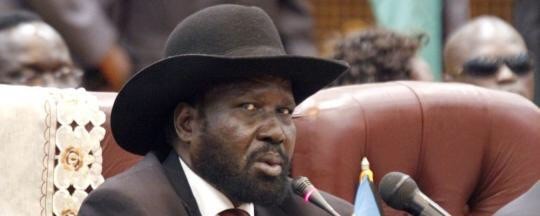President Salva Kiir in a speech Tuesday hinted at the possibility of removing soon some of the new district governors that he appointed just days earlier. He cited pressure to implement a peace agreement that designates certain areas for rule by SPLM-IO governors.
Kiir is seeking to create 28 new districts in place of the ten states established by the country’s 2011 constitution. Each district will be ruled by a governor and lawmakers appointed by the central government, reversing constitutional provisions that require such officials to be elected.
The president has come under criticism for allegedly breaching the August peace deal, which contains a power-sharing formula based on ten states, not 28. Specifically, the peace agreement says SPLM-IO must nominate the governors of Upper Nile and Unity states.
In a decree on Christmas Eve, Kiir appointed 28 new district governors, none of whom were SPLM-IO members.
Mediators of East African regional bloc IGAD have said Kiir’s proposal to break up the existing states violates the peace agreement “in letter and spirit,” and they proposed that he defer his decision on this matter until the permanent constitution-making process gets underway.
Kiir responded to criticisms in remarks Tuesday at the inauguration ceremony of the 28 district governors. He hinted that he may be willing to appoint some SPLM-IO governors, reversing some of his Christmas Eve appointments, but he did not say how many.
The president stated: “In the agreement there were states given by those who wrote the agreement to the opposition… that is, Unity State and Upper Nile State. And then if you read the agreement you will find that there are percentages that are given to the IO in all the states.”
“So with this that we have now created 28 states instead of 10 states, people are now complaining that it is a violation of the agreement – the agreement was supposed to be implemented on the ten states. We say this is not a violation because this is a demand of the people.”
Addressing his remarks to the newly appointed district governors, Kiir continued, “So when the opposition (SPLM-IO) comes in, and we will talk now about what will be done, the people who are holding positions in these two states of Unity and Upper Nile, I want you to bear with us, that if the opposition want to take over the positions that you are now occupying, you have to accept – and we will tell you.”
“It will be from this government to tell you that IO is now coming over to take over ‘such and such’, you will have to step down if you are asked to. Because without that we cannot implement the agreement,” Kiir said.
These remarks are more apparently conciliatory than the tone struck by the Christmas Eve decree. However, they do not entirely clarify how much Kiir may be willing to concede to the SPLM-IO nor under what conditions. At stake is whether the SPLM-IO will be allowed to rule all areas of the contested Unity and Upper Nile states, or only parts of those states.
Upper Nile State is divided by Kiir’s decree into three districts: Latjoor, Eastern Nile and Western Nile; Unity State is likewise divided into three: Ruweng, Southern Lich and Northern Lich.
Three of six of these districts (Ruweng, Northern Lich and Eastern Nile) are largely or entirely controlled by Kiir’s forces and contain key loyalist constituencies that the president may be reluctant to allow to be governed by an SPLM-IO governor, which would potentially alienate allies in those areas.
The other three areas – Western Nile, Latjoor and Southern Lich – are partly or largely under SPLM-IO control, and are therefore more likely to be conceded.
Notably, the peace agreement’s deadline for appointment of SPLM-IO governors in Unity and Upper Nile states and for formation of a transitional government has already passed.
JMEC, the Joint Monitoring and Evaluation Commission, a body headed by former Botswana President Festus Mogae, has recently convened meetings to discuss the formation of the transitional government.
In a speech before Christmas, Mogae highlighted the urgency of forming the transitional government of national unity and other transitional institutions.




